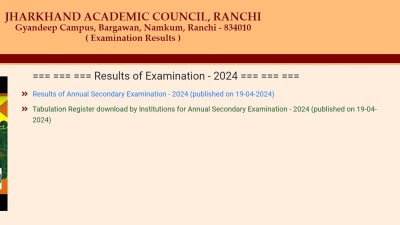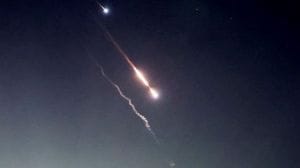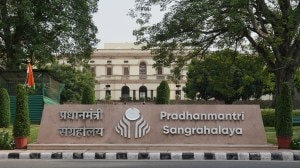- India
- International
Lack of clarity about the role of Chief of Defence Staff and bellicose talk by politicians are not reassuring
The past five years have seen the last vestiges of the Nehruvian legacy being progressively swept away. Conclusive proof of this came when the present government ordered retaliatory raids, in peace time, on Pakistani soil.
 (Illustration: C R Sasikumar)
(Illustration: C R Sasikumar)
Strategic culture is said to have a significant impact on national security and state behaviour. In 1992, RAND Corporation analyst, George Tanham had pronounced that a combination of “lofty Hindu philosophy and a fatalistic outlook” had prevented the development of a strategic culture in India, and that “… Indian elites showed little evidence of having systematically thought about national strategy”.
Tanham’s contentions were contested by those who asserted that being heirs to the rich philosophy of Vedic literature, epics like the Ramayana and Mahabharata, and the wisdom of Chanakya’s Arthashastra, Indians had never lacked a strategic culture.
They also, stressed that, right from independence, India had followed a pragmatic grand strategy, scripted by Jawaharlal Nehru. Its elements included, domestically, secular federalism, a socialist command-economy, pursuit of self-reliance and externally, and a policy of non-alignment to avoid military conflicts.
This Nehruvian legacy was accompanied by a utopian proclivity for pacifism and disdain for the armed forces, rooted in phobia about military coups. According to Yale University professor, Steven Wilkinson, the Congress party evolved “specific ‘coup-proofing’ strategies to balance the power of the military during India’s first decade”.
Most of these measures have remained in place ever since: The military continues to be excluded from the government’s policy/decision-making process and the armed forces HQs are still subordinated to a civilian Department of Defence. Wilkinson suggests that the growth of the Central Armed Police Forces from 29,000 in 1961 to 1.1 million in 2017 is another “coup proofing” measure to “balance” the 1.3-million army.

The past five years have seen the last vestiges of the Nehruvian legacy being progressively swept away. Conclusive proof of this came when the present government ordered retaliatory raids, in peace time, on Pakistani soil. These not only marked a major shift of political focus that brought national security to centrestage, but also shattered two shibboleths: First, that India’s timidity, disguised as “strategic restraint”, was a chronic affliction; and second, that any armed incursion into Pakistan, ran the risk of a nuclear response. The latter, in any case, was an excessively alarmist view, given that the nuclear “red lines” informally signalled by Pakistan are far more stringent.
With the 2019 election-campaign behind us and politics having resumed normal tempo, there has been speculation whether the NDA government’s newfound focus on national security signifies a strategic transformation or merely a vote-garnering election gambit. Such scepticism was not unjustified, given that the BJP’s 2014 election manifesto, had promised to “address the issue of organisational reforms” in defence, and to “ensure greater participation of armed forces in the decision-making process of the MoD”. While the ensuing five years saw no change in South Block, some recent “straws in the wind” may indicate growing political interest in national security issues. The most significant of these and one that demands our close attention is the long awaited initiation of national security reforms. One hopes that the April 2018 appointment of the National Security Adviser (NSA) to head the newly constituted Defence Planning Committee and his post-election elevation to cabinet rank were harbingers of this reform-process.
A lack of transparency, however, raises larger questions about the roles of the Raksha Mantri (RM), the Chiefs of Staff and the Defence Secretary vis-a-vis the NSA in the new ambit of national security decision-making. While Prime Minister Modi’s announcement, on August 15, about creation of a Chief of Defence Staff (CDS), received widespread welcome, it adds a new and complex dimension to India’s national security paradigm.
A CDS must not be created in isolation because, normatively, it carries with it a whole eco-system that could transform India’s national security, if correctly implemented. In theory, as the senior-most armed forces officer and Chairman Chiefs of Staff Committee, the CDS would be the military adviser to the PM and RM. Apart from his key role in the nuclear command chain, he would evolve a prioritised tri-service perspective plan for force modernisation and enable fiscal support. This task would be immeasurably facilitated by the issuance of a national security doctrine/strategy which highlights national aims, objectives and interests, and clearly defines the military wherewithal required to achieve them.
The CDS would oversee the integration of the armed forces HQs with the civilian MoD and implement “jointness” amongst the three armed forces, progressively ushering in the theatre command concept. In reality, however, if not empowered adequately or if found in conflict with the NSA, the CDS could easily be reduced to an inconsequential “paper-tiger”.
Another topic that two RMs, in succession, have dwelt upon — albeit in passing — is the principle of “no first use” (NFU) of nuclear weapons embedded in India’s 2003 Nuclear Doctrine. NFU was adopted, not merely as a token of nuclear restraint and responsible conduct, on India’s part, but also because it is, by far, the least burdensome and inexpensive form of nuclear-deterrence.
While ambiguity and doctrinal unpredictability may be useful to keep one’s adversary off-balance, nuclear deterrence is far too serious a matter to be the subject of off-the-cuff public utterances by senior politicians. On the other hand, a formal review of the nuclear doctrine (including the NFU undertaking) is long overdue and must be undertaken.
In similar vein is casual, bellicose talk about “re-taking” of Pakistan Occupied Kashmir, presumably by military means. Let us remember that a major part of J&K’s territory has been in our physical possession since the state legally acceded to India in 1947. Whether the hearts and minds of the people of the Valley are with us, remains a question unanswered. Once peace and prosperity prevail in our J&K, it is more than likely that the people of PoK would clamour to join their Indian brethren.
Finally, a word of advice for our military leadership. It is most heartening for the citizen to hear, from them, that our troops are in fine fettle and combat-ready. However, one’s confidence evaporates when they are heard parroting political rhetoric or indulging in bombast. We are not Pakistan, and dignified reticence on the part of our soldiery would be far more reassuring.
This article first appeared in the October 17 print edition under the title ‘Light on national security’.The writer is a retired chief of naval staff
EXPRESS OPINION
More Explained
Apr 19: Latest News
- 01
- 02
- 03
- 04
- 05









































